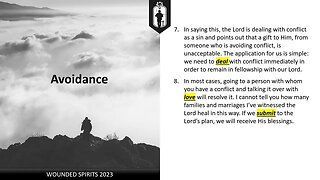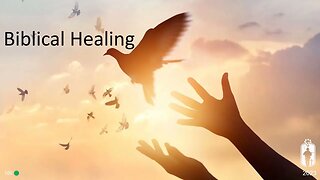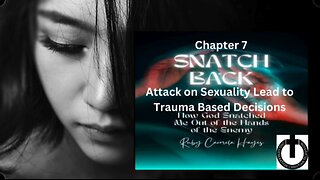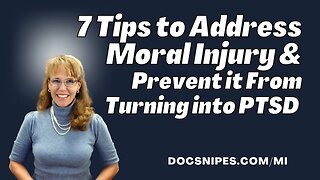PTSD #11 - PTSD and dealing with Physical Abuse, Rape, Child Abuse, and Moral Injury
Doug Carragher from Wounded Spirits Ministries talks about PTSD.
PTSD Conference: Chapters 16 & 18 in the workbook.
You can download the workbook and follow the accompanying notes at: tinyurl.com/StudyPTSD
Dealing with Physical Abuse/Rape. Physical abuse is any intentional act causing injury or trauma to another person or animal, by way of bodily contact. In most cases, children are the victims of physical abuse, but adults can also be victims, as in cases of domestic violence or workplace aggression. Physical abuse may involve more than one abuser, and more than one victim. Physical abuse is always wrong. Physical abuse must be reported to the authorities.
31% of women raped will experience PTSD for the rest of their lives. 13% of American women have been raped and 31% of rape victims have developed PTSD. At least 1 out of every 10 (10%) of men in our country have suffered trauma as a result of sexual assault. People who experience sexual assault may suffer from depression, PTSD, and other emotional problems as a result.
In the US, rape and sexual assault are categorized as follows: “It is an act in which a person sexually touches another person without that person's consent or coerces or physically forces a person to engage in a sexual act against their will.
The Effects of Rape and Physical Abuse.
The effects of child sexual abuse can be long-lasting and affect the victim's mental health. Victims are more likely than non-victims to experience the following mental health challenges:
About 4 times more likely to develop symptoms of drug abuse
About 4 times more likely to experience PTSD as adults
About 3 times more likely to experience a major depressive episode as adults.
The Bible on Rape. When the Bible mentions the crime of rape, it is represented as an extreme violation of God’s design for the treatment of another human being (Genesis 34).
God’s word condemns rape. For example, there is a passage in the laws given to Israel, Deut 22:13–29 spoke directly against forcing a woman into a sexual encounter against her will, or what we call rape today. The command is to protect women, weak and to protect the nation of Israel from committing sinful actions.
The Bible accounts of sexual assault against women are heartbreaking. But they are not brushed under a rug or hushed up. In fact, of the three accounts describing a woman who was sexually assaulted, each of them caused a civil war. Dinah (Genesis 34), Unnamed Concubine (Judges 19-21), Tamar (II Samuel 13). Rape was neither covered up nor ignored. Instead, it was answered and avenged. It was such a cultural convulsion that it was answered with outrage and further violence. Victims must be heard and must be protected.
In the New Testament, rape is not mentioned directly, but it would have been considered sexual immorality. Jesus and the apostles spoke against sexual immorality (Matthew 5:32). Christians are to obey the laws of their governing authorities (Romans 13). Not only is rape morally wrong; it is also wrong according to the laws of the land. As such, anyone who commits this crime should expect to pay the consequences, including arrest and imprisonment.
To the victims of rape, we must offer much care, counsel and compassion. Churches should be aid stations reaching out to the broken. God’s Word often speaks about helping those in need and the vulnerable. As Christians we should do everything possible to model the love and compassion of Christ to assist victims of rape in any way possible.
Ultimately, people are responsible for the sins they commit, including rape. However, no one is beyond the grace of God. Even to those who have committed the vilest of sins, God can extend forgiveness if they repent and turn from their evil ways (1 John 1:9). This does not remove the need for punishment according to the law, but it can offer hope and the way to a new life.
As a rape survivor you are not guilty and should seek the Lord with all your being. The Lord can and will guide you through recovery.
Moral Injury is the damage done to one’s conscience or moral compass when that person perpetrates, witnesses, or fails to prevent acts that transgress one’s own moral beliefs, values, or ethical codes of conduct.
Moral injury is a normal human response to an abnormal event. Those who have seen and experienced death, mayhem, destruction, and violence have had their worldviews shattered - the sanctity of life, safety, love, health, peace, etc. -can suffer moral injury as well.
Self-harming refers to a person harming his/her own body on purpose. Other terms for self-harm are "self-abuse" or "cutting." Overall, a person who self-harms does not mean to kill himself or herself.
Definition of Self-handicapping behaviors (impulsive behavior) refers to a self -sabotaging behavior that will cripple one’s ability the opportunity to recover from moral injury. It is estimated that in the public, 2% to 6% engage in self-harm at some point in their lives.
-
 38:54
38:54
church4u
8 months agoPTSD #10 - PTSD and Relationships - Conflict - Apathy - Self Harm
52 -
 12:35
12:35
church4u
8 months agoPTSD #9 - PTSD and Biblical Healing
9 -
 29:43
29:43
GODSTRUTHSTANDS
1 month agoChapter 7 Attack on My Sexual Identity Lead to Trauma Based Decisions Christian Testimony
43 -
 29:27
29:27
Christian Testimonials, Bible Scriptures and Commentary
3 months agoChapter 7 Attack on Sexual Identity Lead to Trauma Based Decisions Christian Testimony 2ndGCT
28 -
 29:32
29:32
PsychoBible: Babbling about Psychology and Theology!
9 months agoJustifying the Use of Natural Law in Sexuality and Therapy
428 -
 31:10
31:10
The Book of the true Life
1 year agoThe Abuse of free Will is the Cause of human Suffering ❤️ The Book of the true Life Teaching 32 / 366
69 -
 46:50
46:50
Book Of Revelation - The Last Days
9 months agoThe Last Days Pt 460 - Without Natural Affection, Trucebreakers, False Accusers
159 -
 19:57
19:57
Campbellfamily07
1 year agoDAY:35- CHRIST IS NO GENIE IN A BOTTLE (Luke 17:11-19) “Have a Pure Heart…” Christ Helped with PTSD
24 -
 8:55
8:55
News from Jesus
7 months agoSep 20, 2016 ❤️ Dark Souls and Hatred ... Spiritual Attacks and Problems ... Resolving and Healing
70 -
 35:23
35:23
DocSnipes
2 years ago7 Tips to Address Moral Injury and Prevent it From Turning into PTSD
32